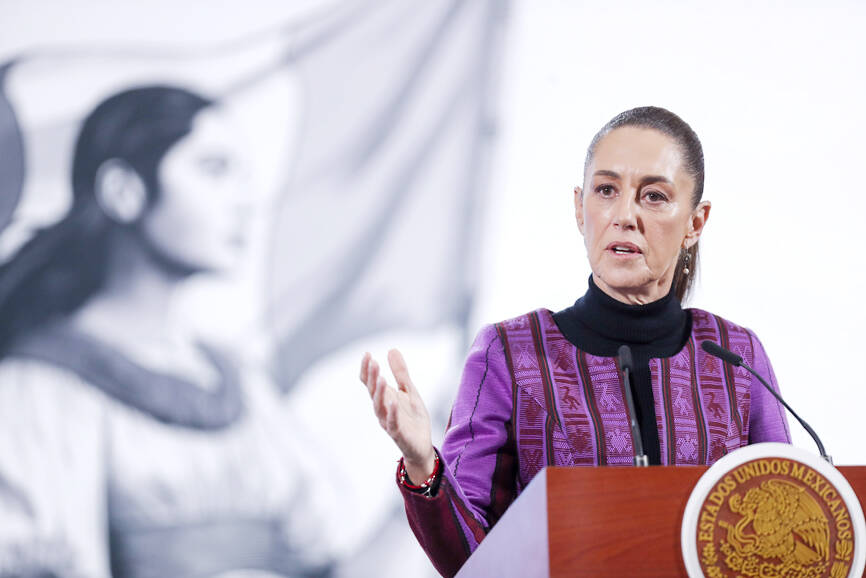US President Donald Trump’s administration told Mexican officials that they should put their own duties on Chinese imports as part of their efforts to avoid tariffs threatened by Trump, people familiar with the matter said.
US Secretary of Commerce Howard Lutnick was among US officials who conveyed that message at a meeting on Thursday last week in Washington with a Mexican delegation, including Mexican Secretary of Economy Marcelo Ebrard, the people said.
US Trade Representative nominee Jamieson Greer and National Economic Council director Kevin Hassett also attended the meeting.

Photo: EPA-EFE
Mexican President Claudia Sheinbaum has bolstered efforts to crack down on cheap imports from China, a move to support domestic industries as well as appease a Trump administration that is threatening 25 percent tariffs on its North American trade partners.
Mexico did not make any commitments on China during the meeting, which ended with an agreement to establish a working group from the two countries to continue exploring trade and tariff issues, the people said.
The Washington meeting was the start of “a constructive dialogue, and joint work would begin on Monday,” Ebrard said in a post on X.
Trump has demanded Mexico and Canada do more to restrict the flow of migrants and fentanyl into the US or face 25 percent tariffs.
Originally set for Feb. 1, the White House delayed implementing those duties for a month. Meanwhile, the US imposed an additional 10 percent tariff on all imports from China.
Separately, Australian Treasurer Jim Chalmers said he would be traveling to Washington later yesterday, as the US ally presses its case to be excluded from tariffs.
“Trade and tariffs will be part of the conversation, but not the whole conversation,” Chalmers said on Australian Broadcasting Corp’s Insiders program.
He said he plans to meet with US Secretary of the Treasury Scott Bessent and to highlight areas of economic partnership, including the large investments made in the US by Australia’s US$2.6 trillion pension industry.
While Trump earlier this month agreed to consider an exemption for Australia from tariffs on steel and aluminum, Senior Counselor to the President for Trade and Manufacturing Peter Navarro quickly threw that into doubt, saying that Australia was “killing” the US aluminum market.
“I don’t expect to conclude those discussions on steel and aluminum while I’m in DC,” Chalmers said. “But whether it’s the flow of capital or critical minerals and trade, there’s lots to talk about.”
Chalmers said he would also address the Australian Superannuation Investment Summit, which is being held in the US capital. Large Australian funds invest about one in five dollars of members’ retirement savings in the US, according to a statement issued collectively by representatives attending the event.

Taiwan Semiconductor Manufacturing Co (TSMC, 台積電) yesterday said that its investment plan in Arizona is going according to schedule, following a local media report claiming that the company is planning to break ground on its third wafer fab in the US in June. In a statement, TSMC said it does not comment on market speculation, but that its investments in Arizona are proceeding well. TSMC is investing more than US$65 billion in Arizona to build three advanced wafer fabs. The first one has started production using the 4-nanometer (nm) process, while the second one would start mass production using the

When an apartment comes up for rent in Germany’s big cities, hundreds of prospective tenants often queue down the street to view it, but the acute shortage of affordable housing is getting scant attention ahead of today’s snap general election. “Housing is one of the main problems for people, but nobody talks about it, nobody takes it seriously,” said Andreas Ibel, president of Build Europe, an association representing housing developers. Migration and the sluggish economy top the list of voters’ concerns, but analysts say housing policy fails to break through as returns on investment take time to register, making the

‘SILVER LINING’: Although the news caused TSMC to fall on the local market, an analyst said that as tariffs are not set to go into effect until April, there is still time for negotiations US President Donald Trump on Tuesday said that he would likely impose tariffs on semiconductor, automobile and pharmaceutical imports of about 25 percent, with an announcement coming as soon as April 2 in a move that would represent a dramatic widening of the US leader’s trade war. “I probably will tell you that on April 2, but it’ll be in the neighborhood of 25 percent,” Trump told reporters at his Mar-a-Lago club when asked about his plan for auto tariffs. Asked about similar levies on pharmaceutical drugs and semiconductors, the president said that “it’ll be 25 percent and higher, and it’ll

CHIP BOOM: Revenue for the semiconductor industry is set to reach US$1 trillion by 2032, opening up opportunities for the chip pacakging and testing company, it said ASE Technology Holding Co (日月光投控), the world’s largest provider of outsourced semiconductor assembly and test (OSAT) services, yesterday launched a new advanced manufacturing facility in Penang, Malaysia, aiming to meet growing demand for emerging technologies such as generative artificial intelligence (AI) applications. The US$300 million facility is a critical step in expanding ASE’s global footprint, offering an alternative for customers from the US, Europe, Japan, South Korea and China to assemble and test chips outside of Taiwan amid efforts to diversify supply chains. The plant, the company’s fifth in Malaysia, is part of a strategic expansion plan that would more than triple